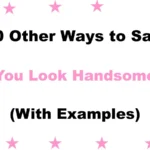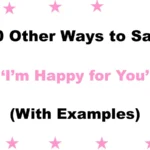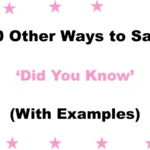Finding the right words to express care and attention can make all the difference in how your message is received. Saying “I will keep you posted” is common, but sometimes it feels a bit too generic or impersonal. Using thoughtful alternatives can add warmth and connection, making your communication feel more meaningful and genuine.
Whether you’re updating a friend, a colleague, or a client, having a variety of ways to say this phrase helps you tailor your message to the situation and tone. Below, you’ll find 30 alternatives to say “I will keep you posted,” along with definitions, examples, and guidance on when and how to use each phrase effectively.
What Does “I Will Keep You Posted” Mean?
“I will keep you posted” means that you will provide updates or information as soon as something new happens or you receive news. It expresses a promise to maintain communication and keep someone informed. This phrase conveys attentiveness and commitment to keeping others in the loop, especially in ongoing or evolving situations.
When to Use “I Will Keep You Posted”
Use this phrase when you want to reassure someone that they will receive timely updates. It’s appropriate in professional settings like work projects, client communications, and meetings, as well as in personal contexts, like sharing news with friends or family. It works best when the information is subject to change, or you expect developments over time.
Is It Professional/Polite to Say “I Will Keep You Posted”?
Yes, “I will keep you posted” is both professional and polite in many contexts. It shows respect for the other person’s need for information and signals your responsibility to keep them informed. However, it can sometimes feel informal depending on the tone of the conversation, so alternatives might be preferred in more formal communications.
Pros and Cons of Saying “I Will Keep You Posted”
Pros:
- Simple and clear
- Friendly and reassuring
- Easy to use in most situations
Cons:
- Can sound generic or overused
- Sometimes too informal for very formal settings
- Might lack personalization or warmth
Synonyms for “I Will Keep You Posted”
- I’ll keep you updated
- I’ll keep you informed
- I’ll let you know as soon as I hear anything
- I’ll keep you in the loop
- I’ll keep you advised
- I’ll update you shortly
- I’ll keep you notified
- I’ll keep you aware
- I’ll get back to you soon
- I’ll follow up with you
- I’ll share updates as they come
- I’ll keep you apprised
- I’ll keep you tuned in
- I’ll circle back with you
- I’ll keep you posted on any developments
- I’ll keep you clued in
- I’ll provide updates when available
- I’ll stay in touch
- I’ll keep you connected
- I’ll let you stay informed
- I’ll pass on any news
- I’ll keep you posted every step of the way
- I’ll keep you in the know
- I’ll keep you posted with the latest
- I’ll make sure you’re updated
- I’ll check in with you soon
- I’ll keep you briefed
- I’ll keep you apprised of the situation
- I’ll update you as things progress
- I’ll keep you in sight of what’s happening
1. I’ll keep you updated
Definition: Promise to provide ongoing updates.
Explanation: This is a clear, straightforward phrase that assures someone you will share any new information as it becomes available.
Scenario Example: “Thanks for your patience. I’ll keep you updated on the project status.”
Best Use: In both casual and professional settings where regular updates are expected.
Worst Use: When a single update is expected rather than ongoing communication.
Tone: Friendly, professional, reliable.
2. I’ll keep you informed
Definition: A pledge to ensure someone is aware of all relevant information.
Explanation: This phrase carries a slightly more formal tone, emphasizing thorough communication.
Scenario Example: “I’ll keep you informed about any changes to the schedule.”
Best Use: Professional emails or conversations requiring detailed communication.
Worst Use: Informal or very casual chats where it might feel stiff.
Tone: Polite, formal, attentive.
3. I’ll let you know as soon as I hear anything
Definition: A promise to share news immediately when received.
Explanation: Emphasizes promptness and attentiveness to new information.
Scenario Example: “If there’s any update on your application, I’ll let you know as soon as I hear anything.”
Best Use: When timing is important, and immediacy is key.
Worst Use: Situations where the information flow is slow or irregular.
Tone: Caring, responsive, reassuring.
4. I’ll keep you in the loop
Definition: Ensure someone stays informed within a group or process.
Explanation: This phrase conveys inclusion and transparency, often used in teamwork.
Scenario Example: “I’ll keep you in the loop about the client’s feedback.”
Best Use: Team environments, collaborative projects, or group updates.
Worst Use: Formal correspondence with external parties, where it may feel too casual.
Tone: Inclusive, friendly, informal.
5. I’ll keep you advised
Definition: Promise to provide professional updates or recommendations.
Explanation: Often used in formal or business contexts, suggesting ongoing counsel or information.
Scenario Example: “I’ll keep you advised about the legal proceedings.”
Best Use: Formal emails, legal or business communications.
Worst Use: Casual or personal conversations.
Tone: Formal, respectful, professional.
6. I’ll update you shortly
Definition: Promise to provide new information soon.
Explanation: Indicates a timely follow-up or forthcoming update.
Scenario Example: “I’m gathering the data now and will update you shortly.”
Best Use: When an update is imminent or expected soon.
Worst Use: When the timeline is uncertain or long-term.
Tone: Prompt, professional, courteous.
7. I’ll keep you notified
Definition: Promise to send notifications when relevant information arises.
Explanation: Common in systems or processes that send formal notifications.
Scenario Example: “We’ll keep you notified about your order status.”
Best Use: Customer service, tech support, or automated contexts.
Worst Use: Very casual conversations where it may sound robotic.
Tone: Formal, clear, customer-oriented.
8. I’ll keep you aware
Definition: Ensuring someone remains conscious of developments or facts.
Explanation: Less common but emphasizes ongoing awareness.
Scenario Example: “I’ll keep you aware of any changes in the policy.”
Best Use: Situations requiring vigilance or attention.
Worst Use: Casual updates where it may sound too serious.
Tone: Serious, responsible, formal.
9. I’ll get back to you soon
Definition: Promise to reply or follow up shortly.
Explanation: Slightly broader than keeping posted, it can mean providing any response or update.
Scenario Example: “I’m checking the details and will get back to you soon.”
Best Use: When follow-up information or answers are expected.
Worst Use: When you want to emphasize ongoing updates rather than a single reply.
Tone: Polite, professional, approachable.
10. I’ll follow up with you
Definition: Promise to contact again to discuss or update.
Explanation: Suggests an intentional revisit to the conversation or task.
Scenario Example: “I’ll follow up with you next week after the meeting.”
Best Use: Project management, client relations, or personal check-ins.
Worst Use: When updates are sporadic or unsolicited.
Tone: Professional, thoughtful, proactive.
11. I’ll share updates as they come
Definition: Promise to provide updates continuously as new information arrives.
Explanation: This phrase emphasizes real-time or ongoing sharing of information, suggesting a steady flow of communication.
Scenario Example: “I’ll share updates as they come so you’re never out of the loop.”
Best Use: Situations with frequent developments or when continuous updates are expected.
Worst Use: When updates are rare or irregular.
Tone: Warm, attentive, open.
12. I’ll keep you apprised
Definition: To keep someone fully informed about a situation.
Explanation: Slightly formal, it indicates detailed and careful communication.
Scenario Example: “I’ll keep you apprised of all progress on the contract.”
Best Use: Professional and formal settings where thoroughness is important.
Worst Use: Informal or casual conversations.
Tone: Professional, serious, respectful.
13. I’ll keep you tuned in
Definition: Promise to keep someone aware and engaged with ongoing information.
Explanation: A friendly and slightly informal phrase suggesting active involvement.
Scenario Example: “Stay tuned! I’ll keep you tuned in as things develop.”
Best Use: Creative, casual, or media-related communications.
Worst Use: Very formal or business-only contexts.
Tone: Friendly, engaging, casual.
14. I’ll circle back with you
Definition: Promise to return to the conversation later with updates or answers.
Explanation: Often used in business or teamwork contexts to mean following up.
Scenario Example: “Let me check the numbers, and I’ll circle back with you tomorrow.”
Best Use: Professional environments, meetings, or project updates.
Worst Use: Situations requiring immediate or frequent updates.
Tone: Professional, approachable, proactive.
15. I’ll keep you posted on any developments
Definition: Promise to inform someone as soon as new changes occur.
Explanation: Explicitly refers to updates tied to changes or new information.
Scenario Example: “We’re monitoring the situation closely, and I’ll keep you posted on any developments.”
Best Use: Situations involving dynamic or evolving events.
Worst Use: When no real updates are expected.
Tone: Serious, reassuring, informative.
16. I’ll keep you clued in
Definition: Promise to make sure someone stays informed and knowledgeable.
Explanation: Informal and friendly, this phrase adds a conversational feel.
Scenario Example: “Don’t worry, I’ll keep you clued in on the party plans.”
Best Use: Informal or friendly exchanges.
Worst Use: Formal or professional communications.
Tone: Casual, warm, approachable.
17. I’ll provide updates when available
Definition: Commitment to share new information as it becomes accessible.
Explanation: Neutral and polite, it sets realistic expectations about timing.
Scenario Example: “I’ll provide updates when available, so you’re informed every step.”
Best Use: Professional or formal contexts where updates may be intermittent.
Worst Use: Situations demanding immediate or frequent communication.
Tone: Polite, measured, formal.
18. I’ll stay in touch
Definition: Promise to maintain contact and communication.
Explanation: A broad phrase, indicating ongoing communication but not necessarily about specific updates.
Scenario Example: “Thanks for your help — I’ll stay in touch as things progress.”
Best Use: Personal or professional relationships where ongoing connection matters.
Worst Use: When precise updates are expected.
Tone: Friendly, warm, relational.
19. I’ll keep you connected
Definition: Promise to ensure someone remains linked to information or people.
Explanation: Suggests facilitating access or maintaining communication flow.
Scenario Example: “I’ll keep you connected with the team throughout the project.”
Best Use: Networking, team communication, or collaborative projects.
Worst Use: When just updating on a single topic.
Tone: Supportive, inclusive, professional.
20. I’ll let you stay informed
Definition: Promise to ensure someone remains aware of relevant information.
Explanation: A gentle way to reassure someone that they won’t miss important news.
Scenario Example: “I’ll let you stay informed about any policy updates.”
Best Use: Situations requiring clear, ongoing communication.
Worst Use: Very informal or casual conversations where it may sound stiff.
Tone: Polite, attentive, formal.
21. I’ll pass on any news
Definition: Promise to share news or updates as soon as possible.
Explanation: Friendly and straightforward, this phrase emphasizes sharing news.
Scenario Example: “I’ll pass on any news from the meeting to you.”
Best Use: Casual or semi-formal updates involving news or announcements.
Worst Use: Very formal or technical communications.
Tone: Informal, warm, approachable.
22. I’ll keep you posted every step of the way
Definition: Promise to provide updates throughout the entire process.
Explanation: Emphasizes thoroughness and constant communication.
Scenario Example: “Don’t worry, I’ll keep you posted every step of the way during the project.”
Best Use: Long-term projects or processes where regular updates are important.
Worst Use: Very short or one-time updates.
Tone: Reassuring, committed, warm.
23. I’ll keep you in the know
Definition: Promise to ensure someone is informed and aware.
Explanation: Informal and friendly, this phrase highlights inclusion.
Scenario Example: “I’ll keep you in the know about the party details.”
Best Use: Casual, social, or friendly contexts.
Worst Use: Formal or professional communications.
Tone: Casual, engaging, warm.
24. I’ll keep you posted with the latest
Definition: Promise to update someone with the most current information.
Explanation: Focuses on timely, up-to-date communication.
Scenario Example: “I’ll keep you posted with the latest news from the conference.”
Best Use: Situations where freshness of information matters.
Worst Use: When updates are delayed or irregular.
Tone: Informative, friendly, timely.
25. I’ll make sure you’re updated
Definition: Assurance that someone will receive necessary updates.
Explanation: Confident and reassuring, this phrase promises reliable communication.
Scenario Example: “I’ll make sure you’re updated before the deadline.”
Best Use: Professional and personal settings requiring reliability.
Worst Use: When updates are uncertain.
Tone: Confident, reliable, warm.
26. I’ll check in with you soon
Definition: Promise to contact or update someone shortly.
Explanation: Friendly and conversational, implies a brief follow-up.
Scenario Example: “I’ll check in with you soon after the meeting.”
Best Use: Casual and semi-formal contexts.
Worst Use: When long-term updates are expected.
Tone: Warm, friendly, casual.
27. I’ll keep you briefed
Definition: Promise to provide concise and necessary updates.
Explanation: Often used in formal or business settings, focusing on important details.
Scenario Example: “I’ll keep you briefed on the negotiations.”
Best Use: Formal, business, or military communications.
Worst Use: Casual or detailed updates.
Tone: Formal, professional, precise.
28. I’ll keep you apprised of the situation
Definition: Commitment to inform someone about developments or changes.
Explanation: Slightly formal and detailed, this phrase is good for serious matters.
Scenario Example: “I’ll keep you apprised of the situation as it unfolds.”
Best Use: Professional or serious contexts like crisis management.
Worst Use: Informal or casual chats.
Tone: Formal, serious, responsible.
29. I’ll update you as things progress
Definition: Promise to share updates during the course of events.
Explanation: Indicates ongoing communication throughout a process.
Scenario Example: “I’ll update you as things progress with the project.”
Best Use: Project management, client communications, long-term updates.
Worst Use: One-time updates or static information.
Tone: Professional, clear, reliable.
30. I’ll keep you in sight of what’s happening
Definition: Promise to ensure someone stays aware of ongoing events.
Explanation: Informal phrase highlighting awareness and inclusion.
Scenario Example: “Don’t worry, I’ll keep you in sight of what’s happening with the event.”
Best Use: Casual and friendly updates.
Worst Use: Formal or business contexts.
Tone: Casual, warm, inclusive.
Conclusion
Choosing the right phrase to say “I will keep you posted” can transform your communication from routine to thoughtful and caring. Each alternative phrase offers a different tone—whether formal, casual, professional, or warm—that lets you connect authentically with your audience.
By selecting the appropriate expression for the moment, you demonstrate respect, attentiveness, and genuine concern for those you’re communicating with. Keep this list handy to enrich your language and make every update feel meaningful.
FAQs
1. What does “I will keep you posted” really mean?
“I will keep you posted” means that the speaker promises to update or inform someone about any new developments or changes related to a situation. It shows a commitment to ongoing communication and keeping the other person in the loop.
2. When is it appropriate to say “I will keep you posted”?
It’s appropriate to use “I will keep you posted” when you want to reassure someone that you’ll share updates as soon as you receive them. This phrase is useful in both personal and professional contexts where information might change or evolve over time.
3. Are there more professional alternatives to “I will keep you posted”?
Yes! Alternatives like “I will keep you apprised,” “I will provide updates when available,” or “I will keep you briefed” sound more professional and are perfect for formal emails, business meetings, or official communications.
4. How can I make “I will keep you posted” sound more personal or warm?
To make the phrase warmer and more personal, try alternatives like “I’ll keep you in the loop,” “I’ll keep you clued in,” or “I’ll share updates as they come.” These phrases add a friendly and caring tone to your communication.
5. Can saying “I will keep you posted” be considered polite?
Absolutely! Saying “I will keep you posted” is polite because it shows respect for the other person’s need for information and conveys your willingness to communicate openly and considerately.






